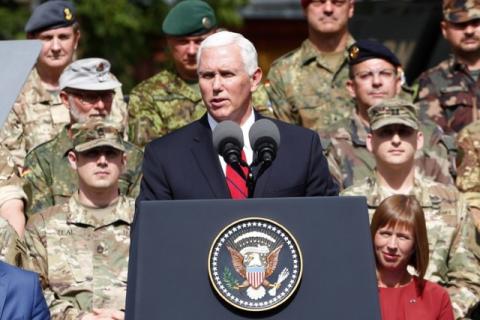Advertisement
VP Pence, in the Baltics, voices support for mutual defense in NATO
TALLINN (Reuters) - U.S. Vice President Mike Pence on Monday assured the Baltic states of U.S. support if they faced aggression from Russia, telling them that Washington firmly backs NATO's doctrine of collective defense.
Pence's comments to the presidents of Estonia, Latvia and Lithuania, ahead of Russian war games on their doorstep, were clearly intended to reassure following Russia's 2014 annexation of Crimea from Ukraine and U.S. President Donald Trump's early lukewarm support for NATO.
During a visit to NATO's Brussels headquarters in May, Trump jarred allies by not restating U.S. support for a critical portion of the alliance's charter and instead berated some members for not spending enough on defense.
Trump has since said he supports the NATO charter's Article 5, the requirement that each member of the alliance defend each other if they come under attack.
"A strong and united NATO is more necessary today than at any point since the collapse of communism a quarter-century ago and no threat looms larger in the Baltic states than the specter of aggression from your unpredictable neighbor to the east," Pence said at news conference with the three Baltic presidents.
"Under President Donald Trump, the United States stands firmly behind our Article 5 pledge of mutual defense. An attack on one of us is an attack on us all."
Russia is scheduled next month to hold large-scale military maneuvers with its ally Belarus. The U.S. army's top general in Europe said this month that the Zapad war games could be a "Trojan horse" resulting in military equipment being left in Belarus.
He warned that Russia continues to "seek to redraw international borders by force, undermine democracies of sovereign nations and divide the free nations of Europe, one against another".
Lithuania's President Dalia Grybauskaite told Lithuanian radio that NATO's air-policing missions would be doubled during the Russian-led Zapad exercise.
Pence is also due to visit Montenegro, the alliance's newest member, and make a stop in Georgia, an aspiring member, which fought a brief war with Russia in 2008.
(Reporting by David Mardiste and Andrius Sytas in Lithuania; Editing by Simon Johnson and Richard Balmforth)



















Add new comment